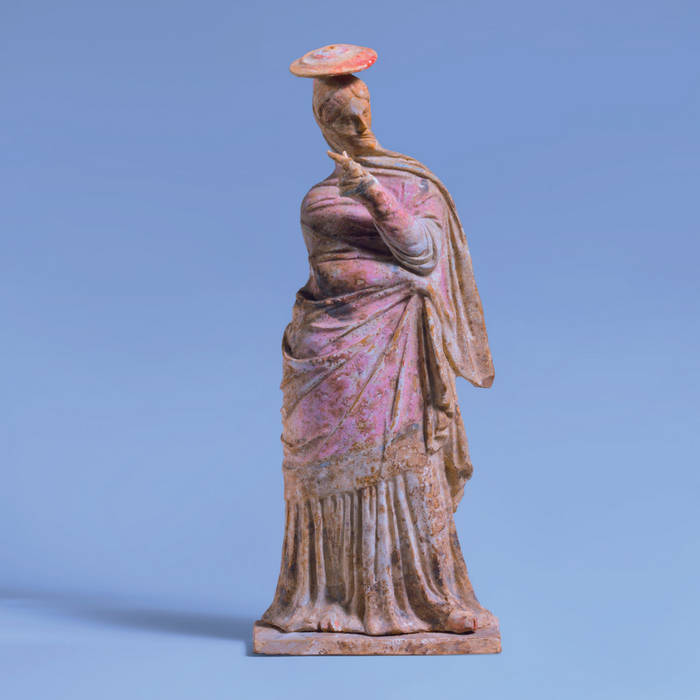The Breakdown
Visual artist, experimental film-maker and ambient classical composer Christina Vantzou works with a method. Following her beginnings as one half of ‘The Dead Texan’ with Adam Wiltzie (Stars of the Lid), she has devoted herself to a series of lengthy projects lovingly documented on the seminal Kranky label. These recordings have revealed themselves with careful regularity, four albums over eight years from 2010’s ‘No.1’ to ‘No.4’ in 2018. Each collection also provokes complementary expressions, generally a re-imagined, remix album but often as impressionistic short films or animations. Such repetition has not been restrictive. It’s just part of Vantzou’s process towards shaping an evolving body of work which has justifiably built her reputation as a key experimental music contributor.
Now comes her new album, resolutely distinguished as ‘No.5’ and available through Kranky from 11th November onwards. The cataclysmic events that locked down the world might account for the shift in her bi-annual release cycle but the collective time-out seems to have allowed Vantzou space to reflect and reconsider her direction. Taking a mass of material that she had been gathering since 2020, Vantzou withdrew to the small Greek island of Ano Koufonisi and honed in on shaping new forms. That location’s resonance with her family heritage and the solitude of the music making process has lead the composer to reflect that ‘No 5’ feels ‘almost like a first album’. Certainly there is something more fluid and less defined about the record. Yes Vantzou’s expressive merging of acoustic orchestration, choral voices and subtle electronics is still key but on this album the abstraction suggests a new level of informality.
The opening trio of vignettes emphasise this looser agenda that Vantzou seems to have created for herself. Shaped by field recordings each brief statement hovers around an elusive context. ‘Enter’ descends into a cavern, dripping with cold nature and echoing to the hollow crack of human activity. Waves of tense strings and groaning bass bounce from the walls and you begin to imagine sounds that on second listen you can no longer find. ‘Greeting’ paces melodramatically, voices shiver and breathe, chains rattle and there is the sound of pursuit, while a minimal bass synth creeps to a three note scale. The final snapshot ‘Distance‘ brings comfort with a ‘straight’ piano etude, played amongst the rising hubbub of chatter, a restaurant, a hotel lounge maybe. The pianist ends abruptly.
Such a sketchy introduction from Vantzou both dares and delivers. It as if she is offering up three apparently disparate pieces as a prologue for the rest of ‘No 5’ and setting the scene, her lone sabbatical on a Greek island, in which the album was created. Other less fragmented pieces seem to further echo this context. ‘Reclining Figures’ glides to a tranquil synth motif, organ toned and horizon bound, with a soft vocal drone for foundation. The track seems to shimmer with a melodic aura, grandiose and elegant as an island sun. ‘Red Eel Dream’ follows a crunching, cricket chirping path to some mystical waterfall, soundtracked by insistent strings which slide from sombre to a patient stillness. Equally woven with the natural ‘Tongue Shaped Rock’ conjures an eerie landscape, spirited with haunting vocals and a slow crawling bass clarinet.
Vantzou acknowledges that the singular music of ‘No. 5’ was also the result of ‘a moment of focus’ that she was able to grasp on Ano Koufonisi. Such concentration and application is reflected in the meticulous brilliance of the record’s pivotal pieces. ‘Memory Of Future Melody’ takes chamber music and deconstructs it with infinite care. The strings may teeter on the brink of improvisation as the piece unravels but nothing prepares you for the siren sounding urgency of the coda. It’s as if the piece has travelled through time to a present day crisis. Similarly staggering, on ‘Kimona’ and its companion ‘Kimona II’ Vantzou takes a piano pattern of Frahm-like beauty and painstakingly re-defines it. The first version keeps close to the soul of Part/Taverner sacred music, a minimal piano feeling for a spiritual path as a single chorister swoops around some echoing chamber. That celestial place may be the starting point for ‘Kimona II’ but here the music seems to be re-located to a more indefinable otherworld. As the piano and voice proceed with less assurance primordial electronic sounds flit and flood over their foundations.
Through all the landscapes that Christina Vantzou leads us to on ‘No 5’, the composer still manages to retain an emphasis on human connectivity and endeavour. Electronics, programming and digitalisation play an important role in her music but she recognises the need to maintain some physicality. The fact that she used seventeen different musicians on the album underlines this commitment. Consequently ‘No 5’ in many ways feels like her most personal recording though remaining enriched by her visual artistry and imagination. It’s almost impossible to listen to any of these pieces without dreaming up some pictorial accompaniment.
It’s already been an astonishing year for neo-classical experimental music with the Claire Rousay, Sarah Davachi, Kali Malone and Jessica Moss releases but even at this late stage Christina Vantzou and ‘No. 5’ bring something different – an economic minimalism and fundamental feel for narrative. Her albums don’t need titles, they tell their own stories.
Get your copy of Christina Vantzou’s ‘No,5’ from your local record shop or direct from: https://christinavantzou.bandcamp.com/album/no-5














No Comment